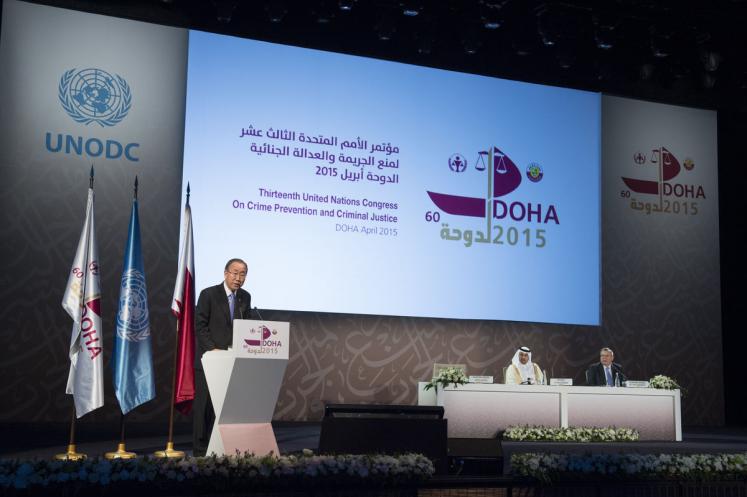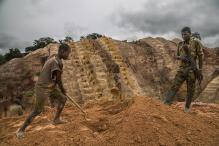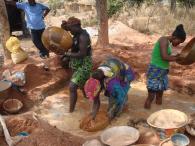Last week, John de Boer and I attended the 13th UN Crime Congress in Doha, Qatar. This year’s session gathered about 4,000 participants, including several notable first-time attendees such as the UN Secretary-General, the president of the General Assembly and the President of the Economic and Social Council (ECOSOC).
Unlike the Commission on Crime Prevention and Criminal Justice (CCPCJ), one of the two inter-governmental governing bodies of the United Nations Office on Drugs and Crime (UNODC), where resolutions are negotiated and adopted in the field of crime prevention and criminal justice, the Crime Congress acts as an international forum for the exchange of views and experiences between governments, civil society, academia and independent experts. Held every 5 years under the auspices of UNODC, the Crime Congresses also help establish a set of priorities as delegates prepare for the annual CCPCJ meeting in April.
This year, the Congress focused on “Integrating crime prevention and criminal justice into the wider UN agenda to address social and economic challenges and to promote the rule of law at the national and international levels”. With only six months to go before the UN Summit in September, which will adopt the final post-2015 development framework, the tenor of the discussion at the Congress revealed some uncertainty with regard to the status of the goals and targets related to criminal justice and the rule of law. This uncertainty derives from four intrinsic challenges associated with the rule of law: 1) the ambivalent definition and interpretation of this broad concept; 2) the political sensitivity among Member States when it comes to justice and rule of law issues; 3) the increasing number of UN and non-UN agencies with a rule of law mandate and the associated coordination challenge; and 4) the lack of an implementation strategy for the rule of law within the overall development framework.
-
First, the vast number of sessions and their wide scope (a total of nearly 200 high-level panels and side-events) highlighted that the rule of law is quite a broad and relatively loosely defined concept. This was also illustrated in the thunderclap that was organized in the run-up to the Congress, where people were invited to explain what the rule of law meant to them. From the absence of discrimination to the respect of the laws of a country, security and freedom, the responses spanned a wide array of – sometimes difficult to reconcile – topics and priorities. Secretary-General Ban Ki-moon himself participated in the initiative, defining the rule of law as “A life of dignity for all where justice prevails” while Deputy Secretary-General Jan Eliasson listed “Accountability, access to justice, certainty, equality and human rights” as its main features. These extensive interpretations of the rule of law are also revealed in the Doha Declaration, which was unanimously adopted by delegates on the first day of the Congress. The 13-page document covers areas as diverse as gender-based violence, equality before the law, prison policies, terrorism, cybercrime, corruption and money-laundering, to name only a few. While all of these issues are indeed important and relevant to the rule of law as a whole, this catalogue of topics tends to suggest a worrying lack of prioritization, which will make it difficult to achieve anything meaningful.
-
Despite the unanimity of the adoption of the Doha Declaration, the rule of law is still a political struggle. As the president of the ECOSOC highlighted during the Congress, at a High-Level Panel on Rule of Law, Human Rights and the Post-2015 Agenda, the integration of the rule of law in the current Sustainable Development Goals has been the result of a very long and arduous battle on each and every word among Member States. While some proposals included a stand-alone goal on justice and rule of law as overarching drivers and enablers of development, this term only appears in one of the draft targets agreed upon by the Open Working Group (16.3 – Promote the rule of law at the national and international level and ensure equal access ). This left many delegations disappointed at the time, and it is still uncertain if that target will survive the negotiations in the run up to the September Summit. As I have already highlighted in a previous post, many States continue to regard justice, security and the rule of law as domains that fall under their domestic sovereignty and, as such, are not willing to be bound by universal goals.
-
As the presence of many different organizations at the Congress also made clear, a growing number of agencies – including UN agencies and other international organizations, NGOs and the private sector (for example, Microsoft sponsored seven events during the Congress) – are now involved in rule of law activities. Within the UN family, besides UNODC, the UN rule of law community includes organizations such as the Department for Peacekeeping Operations (DPKO) through its dedicated Office of Rule of Law and Security Institutions, the Office of the High Commissioner for Human Rights (OHCHR) via its work on justice development, the UN Development Programme (UNDP) and the Office of Legal Affairs, to name a few. As this number increases, the issue of coordination of their activities to ensure the efficiency of the overall system will be of major importance. Although some initiatives, such as the creation of a Global Focal Point for Police, Justice and Corrections to coordinate DPKO and UNDP’s action in post-conflict and crisis situations, have taken up the issue of coordination as a priority, their impact on the ground remains limited.
-
Finally, there seems to be very little strategic thinking under way on how governments and other actors involved in the implementation of these goals and targets will manage to report on their achievements. While both the President of ECOSOC and the President of the General Assembly highlighted the need for robust indicators to measure progress, even the most widely used ones, such as homicides to monitor violence, have limitations. As John de Boer explained in his intervention at a UNODC side-event, homicide data in some regions (especially in sub-Saharan Africa) is almost non-existent and it is increasingly difficult to differentiate between homicides and conflict-related deaths as in many contexts political groups might take criminal strategies and vice-versa.
As the Congress came to an end, I couldn’t help but wonder about the value of these types of mega gatherings. While the Doha Declaration was unanimously adopted on the first day of the Congress, it is more a political declaration of intention rather than a binding document, and its thematic coverage is so broad and its policy recommendations so general, that it is difficult to see how it could possibly provide any kind of guidance for the next CCPCJ and, even less so, for the finalization of the post-2015 framework and its implementation. The Congress also felt like a missed opportunity, as no real debate was held on major complex issues – such as corruption or the links between terrorism and transnational organized crime – which revealed UNODC’s reluctance to take a stand and create a platform for real debate while promoting capacity-building and international cooperation as a remedy against all evils. In addition, despite the unanimity behind the adoption of the Doha Declaration, the sessions clearly demonstrated a wide variety of interpretations with regard to what the rule of law entails, especially as to how it relates to the promotion and protection of human rights. In that perspective it is quite telling that the Congress was held in Qatar, a country scoring near rock-bottom in the Freedom House’s “political rights” ranking and has been criticized for violating the human rights of migrant labourers.
Suggested citation: Louise Bosetti., "The Post-2015 Development Agenda and Its Rule of Law Dilemma: A Report From the 13th UN Crime Congress," UNU-CPR (blog), 2015-04-29, https://unu.edu/cpr/blog-post/post-2015-development-agenda-and-its-rule-law-dilemma-report-13th-un-crime-congress.




